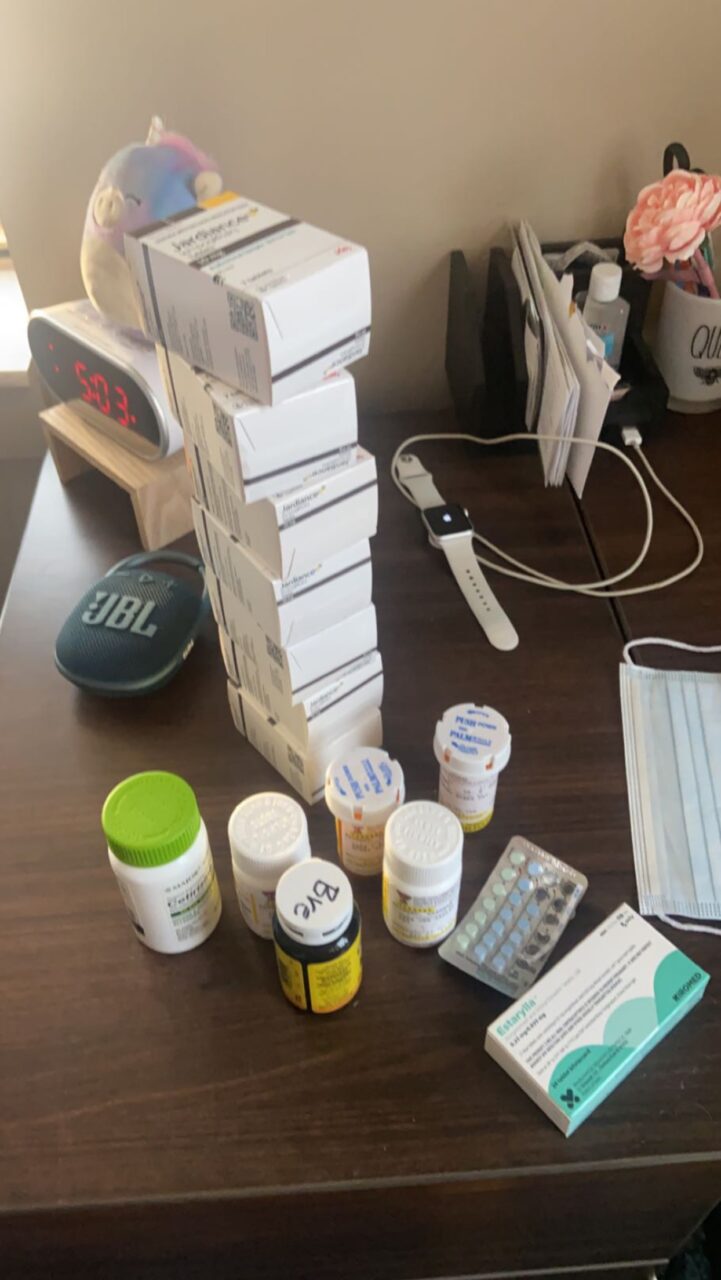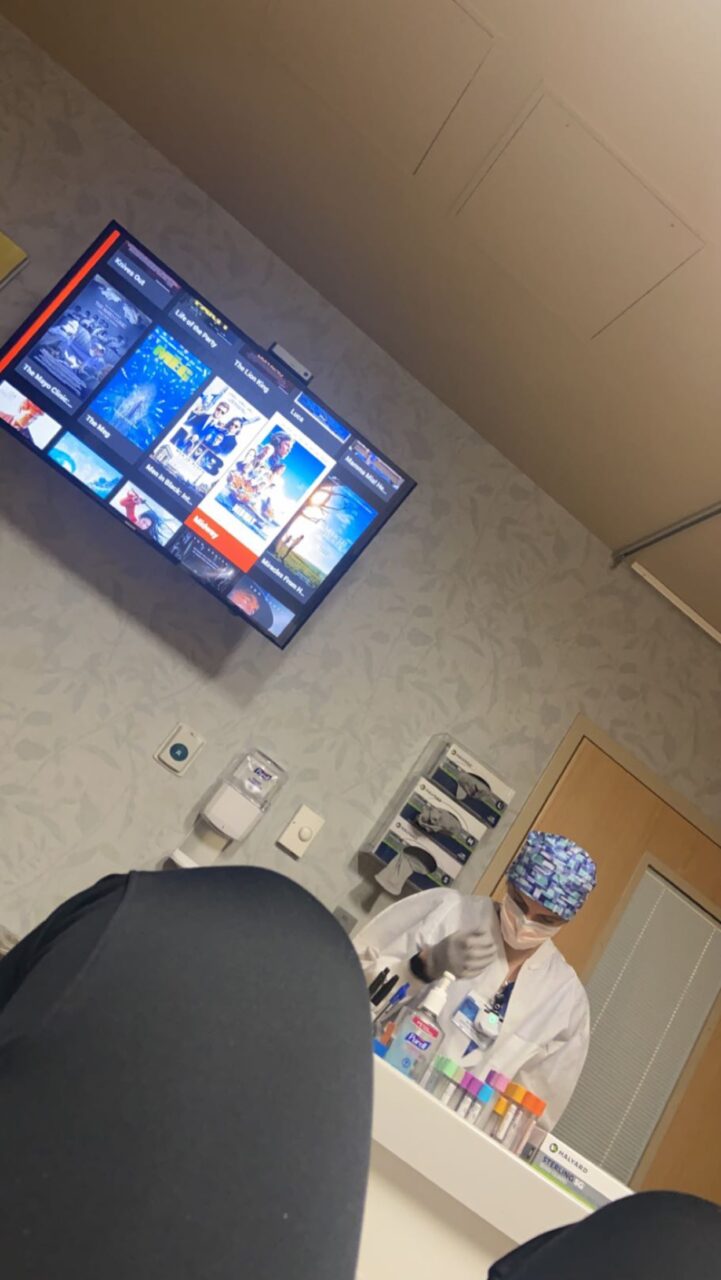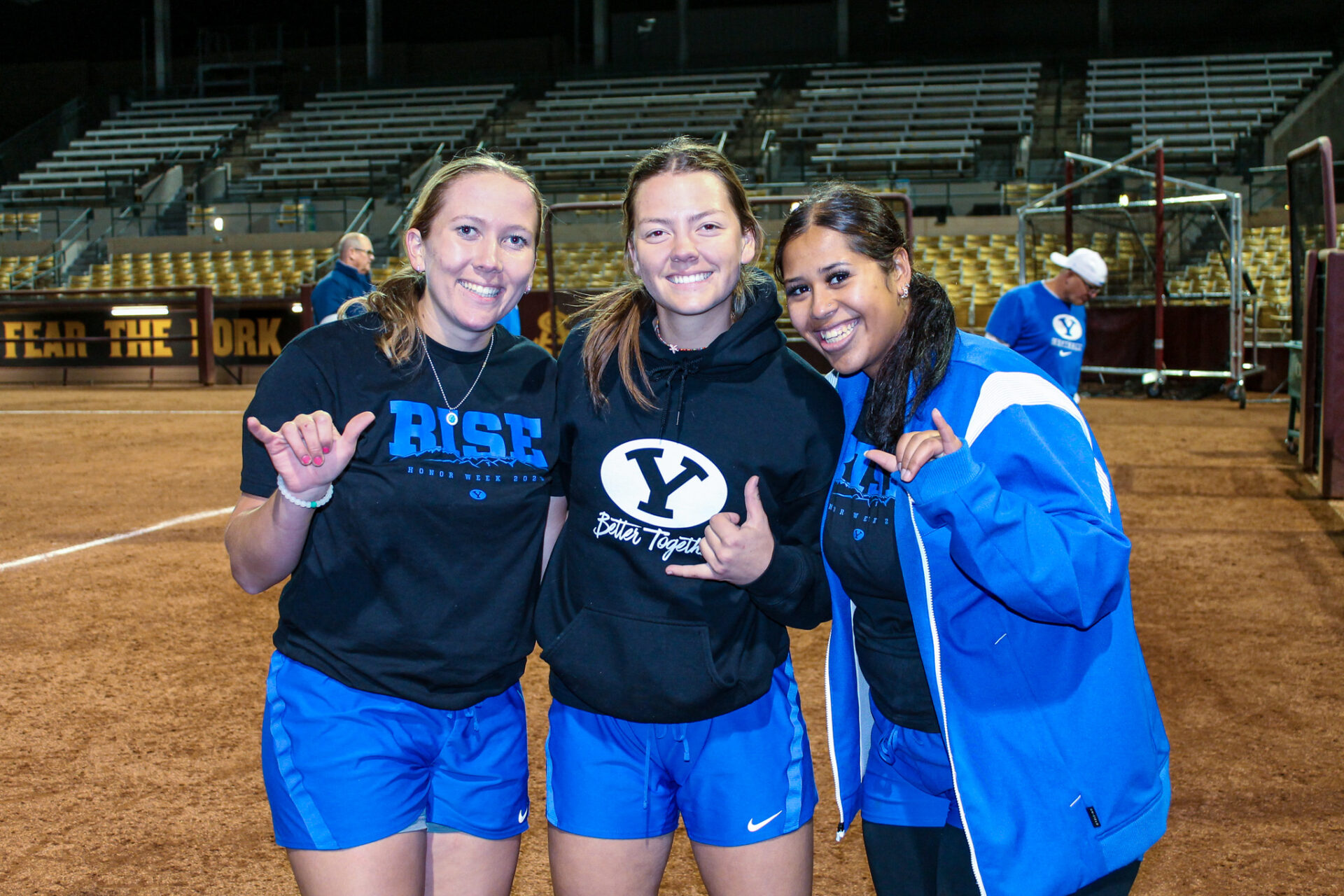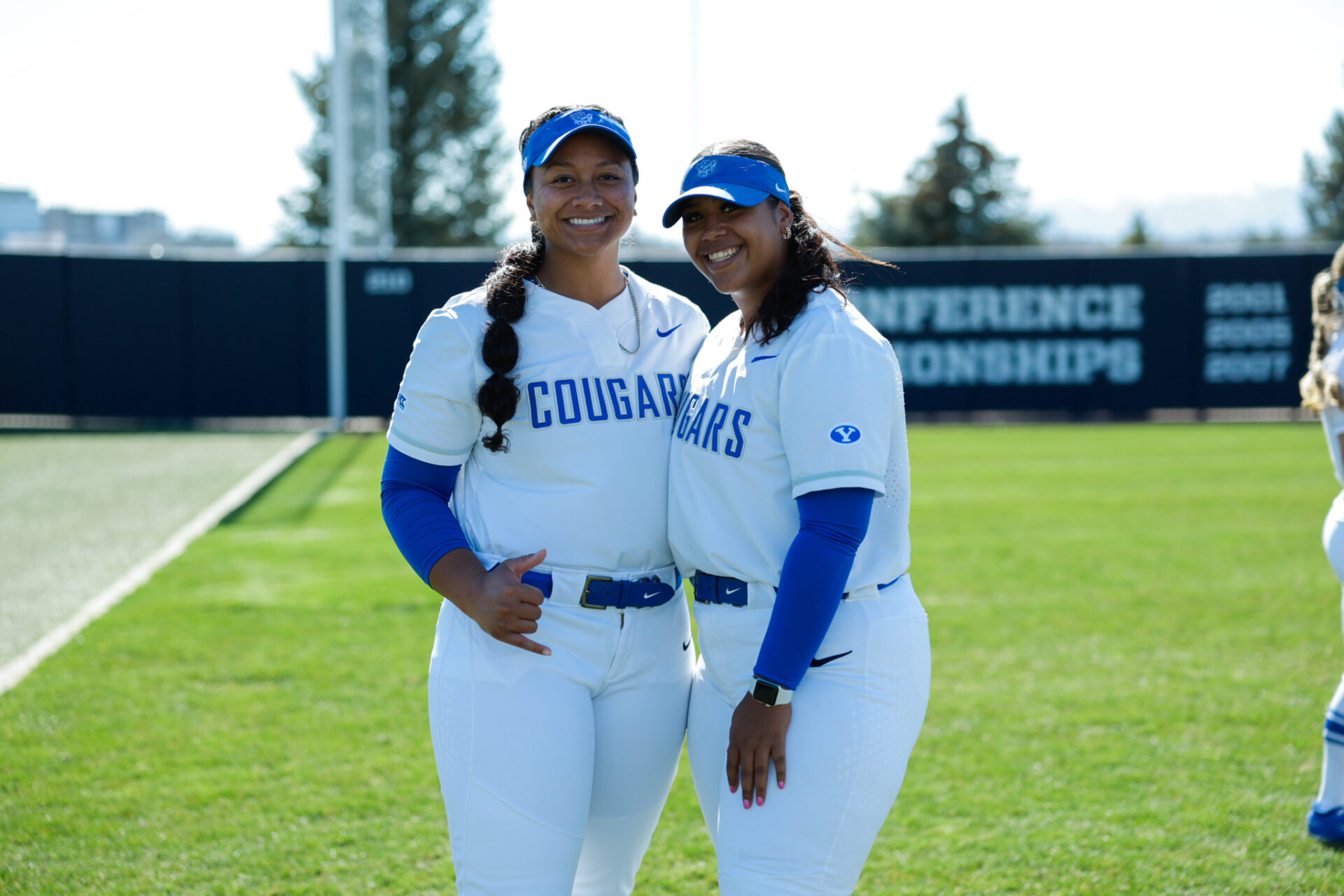Breanna Hayward sees BYU softball as a second chance at her career after life threatening circumstances
Imagine working your whole life for something, but once you get there, it gets shut down and taken away from you in an instant.
BYU softball player Breanna Hayward went through this at the age of 18. Throughout her life, she had been playing softball since she could remember. She found an early love for it. Breanna, who goes by “Breezy,” has an inspiring, miraculous story about how she got to BYU — a personal story she hasn’t shared with most people.
Originally, Breezy played for Loyola Marymount University in California, but her coach ended up transferring to Texas Tech, so she followed her to the Big 12 school. However, from the moment she left her hometown and stepped foot onto Texas Tech’s team, she was hit with major life-changing news.
Just a few days after her parents moved her into the dorm, the freshmen on the team had to go through their mandatory physicals. Within this physical, Breezy got her first EKG. Breezy didn’t understand what this was and asked her teammates why they needed to get the test.
“My teammates told me that it was nothing to worry about and that they usually see something, but it’s never anything big,” Breezy said.
After this, she wasn’t really worried about the EKG anymore. However, while the doctor was looking at her heart, Breezy noticed that she was looking at it closely for a long time. After a few minutes, the doctor had called two other doctors in to look at her EKG, while Breezy was just sitting confused as to what they were seeing. It went on and on, but soon after it was done, she wasn’t prepared for the diagnosis.
“I didn’t know anything. I was just sitting there. After that, the doctor turned the machine off and said, ‘Honey, you have dilated cardiomyopathy.’ I asked her what that meant and she basically told me that my heart wasn’t good,” Breezy said.
Breezy had spent her whole life playing softball and being active. So the moment she heard this news, she was extremely confused. She felt fine and didn’t believe that she had something wrong with her heart. This was something that older individuals usually get when they’re close to dying. Breezy was so young and athletic, so how could this be?
She called her parents to let them know about her heart condition. They immediately made multiple doctor appointments and visited a cardiologist at Texas Tech.
“They told me that I wasn’t ever going to play softball again and that I was lucky to be alive with an enlarged heart,” Breezy said.
Breezy’s life took a full 180 turn. She was just 18 years old, had barely left home for college, and she was told that she was lucky to be alive.
During her time at Texas Tech, she couldn’t participate in any of the activities related to softball — condition, run, hit, throw — nothing.
“I basically went from being a student athlete to instantly just a student,” Breezy said.
Although she was still on the team and had access to the student-athlete resources, she wasn’t treated like an athlete anymore. She then medically redshirted her sophomore year.
“I kept thinking, ‘No, I’m young and athletic and like I still have a life’,” Breezy said.


Breezy sought a second opinion from another cardiologist at Mayo Clinic in Scottsdale, Arizona, closer to home. They told her the same thing she had been hearing, but added that they were going to figure out a way to get her back on the field. As a result, she had to wear a vest around her every day to monitor her heart rate and its activity for doctors to do more research on.
“They were afraid that I could drop at any minute, so the life vest didn’t only monitor my heart rate, but it was made to also be able to shock me back to life if I ever did suddenly go down,” Breezy said.
Breezy’s EKG showed that the amount of blood oxygen flowing in her body was at 16%, when it is supposed to be at a normal percentage of 50% to 70%. Texas Tech told her if her health can improve that they would clear her. After getting her blood oxygen up, they still didn’t clear her.
At this point, she was done with all of it. The way she was being treated for her heart and then not being cleared after the improvement she made in her health was her breaking point. Breezy decided that she was going to transfer to another school and didn’t tell anyone but her close friend.
Through the search, Breezy didn’t find a lot of schools that would clear her, but she had luck with one. BYU was the only school that would clear her to play.
At the time, BYU assistant coach Todd Judge was able to fight for Breezy. Breezy had known Coach Todd throughout early years of softball as he trained her for five years before college, so it meant something special to her for him to fight to put her onto the team.
“I would tell the athletic trainers and the coaches that he has trained me for years before this ever happened to me and he truly knows me and my potential to play,” Breezy said.
It’s safe to say Breezy’s time at Texas Tech was a rough start to college. Doctors told her that she should have swollen ankles, that she shouldn’t be able to carry on long conversations, and so much more, but she was able to do it all and this is why she didn’t stop fighting to play softball.
During this time, Breezy did everything she could to get support for herself. However, she would cry often at night and contemplate her situation a lot.
“I was so depressed. I would go to therapy and even go to injured athlete support groups. And that was the only thing that would actually help me through it,” Breezy said.
Breezy had friends and family there for her. BYU teammate Maddie Bejarano knew Breezy before she transferred to BYU from softball their 8th grade year. Maddie found out about Breezy’s medical condition during her junior year at UCF and Breezy’s freshman year at Texas Tech. She was there for Breezy during those difficult days.
“We were supposed to be playing each other so I reached out to her the night before and told her that I was excited to see her again,” Maddie said.[KB4]
However, Maddie didn’t expect what [KB5] Breezy was going through. She had to tell Maddie that she wasn’t going to be there because of her heart condition.
“It was absolutely heartbreaking to read that message from her because of how passionate she is about the game. It’s always hard to hear that somebody you care about and you’ve known for a long time is going through something that hard,” Maddie said.
Furthermore, BYU teammate Alyssa Aguilar played softball with Breezy throughout middle school and high school. They both committed to Texas schools, but were on the opposite ends of the state from each other when Alyssa had found out.
“I just tried to be there for her and let her know that she was going to be okay and that there was going to be a plan for her to play softball again,” Alyssa said.
Alyssa knew that Breezy was going through a very hard time at Texas Tech since she couldn’t play the sport she loved. However, Alyssa had committed to BYU a semester before Breezy did so when she found out that BYU gave Breezy a second chance, she was more than excited to have Breezy play with her again.
“It was awesome when BYU gave her an opportunity. I told her how amazing it is over here and what a great opportunity it was for her. When she got here, I tried to be someone that she could always talk to about her situation,” Alyssa said.
Ever since Breezy decided to commit to BYU, she has been defying the odds the doctors told her wasn’t possible.
“It’s amazing being at BYU. Not a lot of people know what I went through because I constantly put on a happy face since I do enjoy the sport itself,” Breezy said.
Not a lot of people can come back from dilated cardiomyopathy the way Breezy did. Breezy still mildly has it to this day, but her heart is stronger than it was before and is cleared to play softball at BYU. She takes less medications, only has annual checkups and can do a lot of the things she was told she wouldn’t be able to ever again.
“I feel so much closer with this team because I’m out there sweating with them and doing everything with them,” Breezy said.


BYU softball gave Breezy her second chance at playing softball and didn’t look at her heart condition as a reason not to play or be a part of the team. Although Breezy has gone through a lot trying to get back into playing, she is beyond grateful for what BYU still had to offer her.
“Being out here, I don’t take it for granted. This is my second chance at things and it’s super fun and exciting to be with the girls on the team. I finally feel like the student athlete I’m supposed to be,” Breezy said.

